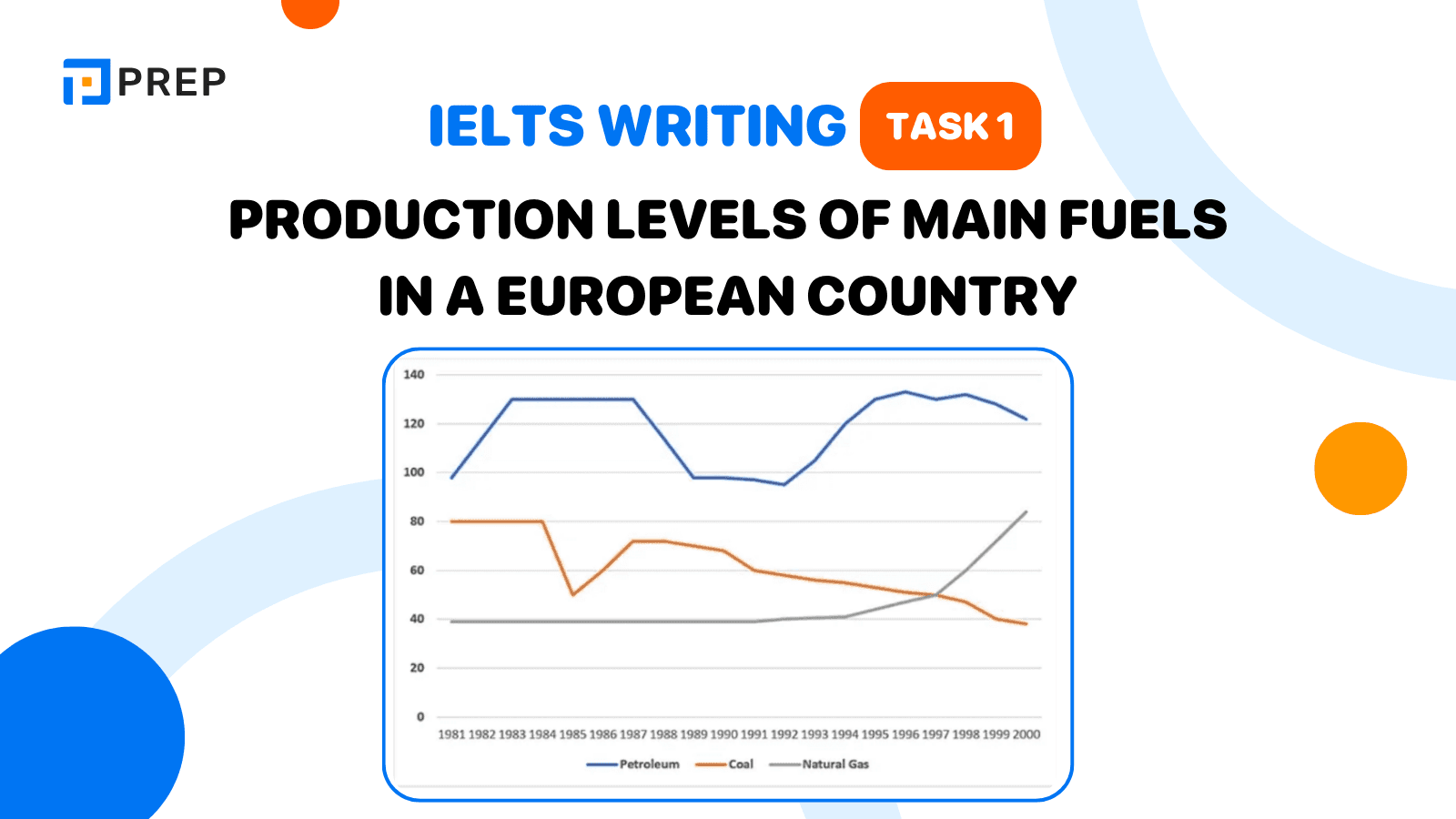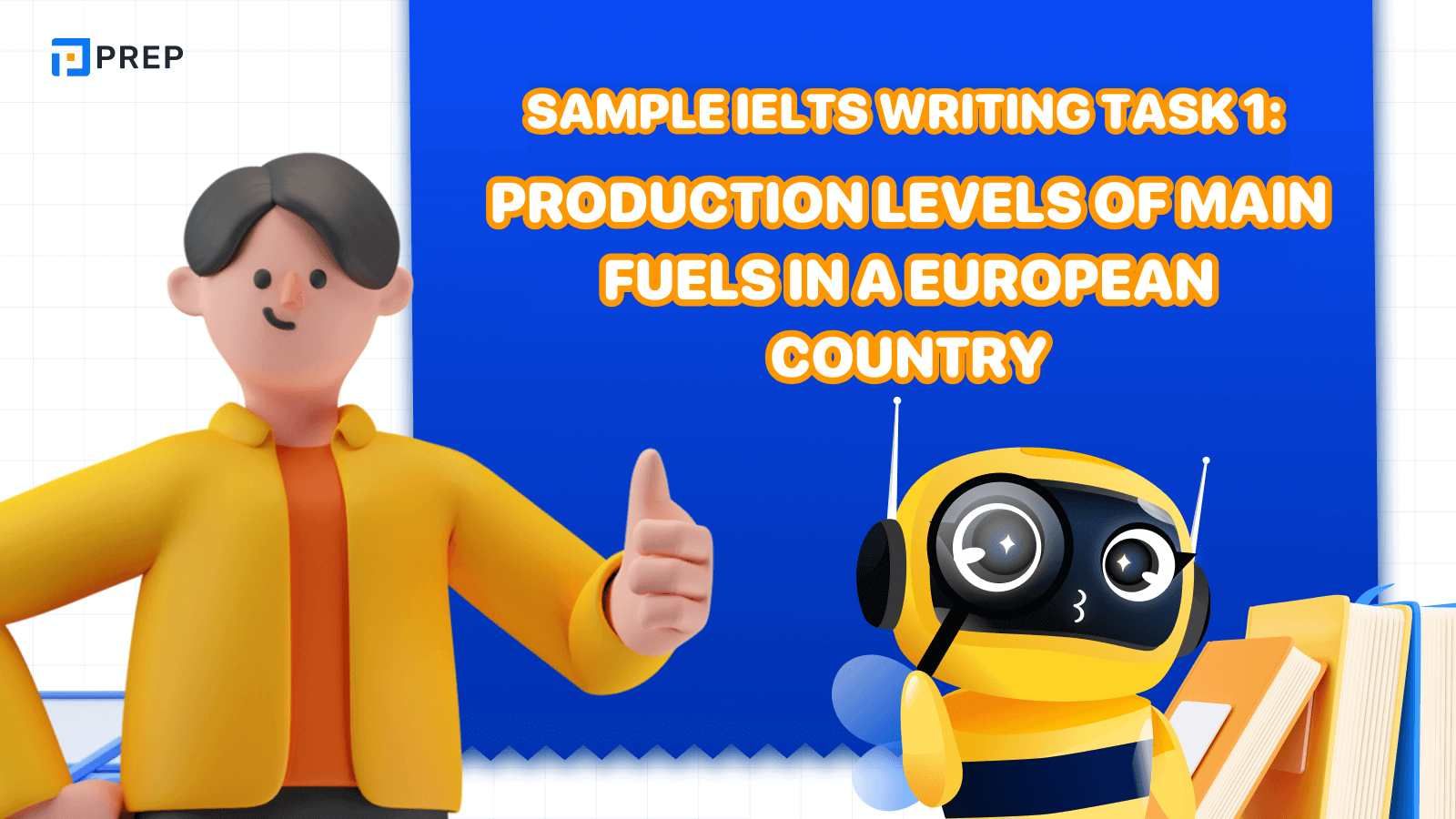Sample IELTS Writing Task 1: Production levels of main fuels in a European country
How can you effectively tackle the IELTS Writing Task 1 topic "Production levels of main fuels in a European country" and achieve a high band score? Let's review the outline, sample response, and high-scoring vocabulary from PREP below!
- I. The task: IELTS Writing Task 1 Production levels of main fuels in a European country
- II. Outline for IELTS Writing Task 1 Production levels of main fuels in a European country
- III. Sample essay for IELTS Writing Task 1 Production levels of main fuels in a European country
- IV. "The Ultimate Ecosystem for Scoring Speaking & Writing" - The Exceptional Collaboration between Instructors and AI

I. The task: IELTS Writing Task 1 Production levels of main fuels in a European country
The task: The line graph shows the production levels of main fuels in a European country from 1981 to 2000.

II. Outline for IELTS Writing Task 1 Production levels of main fuels in a European country
Please review the sample outline for IELTS Writing Task 1 Production levels of main fuels in a European country suggested by teacher Nhat Pham below:
|
Body 1 |
|
|
Introduction |
Paraphrase the question |
|
Overview |
Comment on the most noticeable trend and the biggest difference for:
|
|
Body 2: Production level of petroleum, coal and natural gas from 1980 to 1990 |
|
|
Compare the production level for each type of resources in 1980 |
|
|
Comment on the trend |
|
|
Body 3: Production level of petroleum, coal and natural gas from 1990 to 2000 |
|
|
Comment on the trend and make relevant comparison for the production of petroleum, coal and natural gas after 1990 |
|
III. Sample essay for IELTS Writing Task 1 Production levels of main fuels in a European country

Below is a sample essay for IELTS Writing Task 1 response for the prompt "Production levels of main fuels in a European country" with a band score of 7.0 or higher, along with high-scoring vocabulary related to the topic. Review this with PREP to effectively practice IELTS Writing at home!
The line graph illustrates how the volume of three types of energy produced in a European country changed from 1981 to 2000. Throughout the period, the amount of petroleum fluctuated, and natural gas experienced an increase, while the figure for coal was on a downward trajectory. In addition, petroleum was the most produced fuel source every year.
In 1980, the production level of petroleum was higher than the other figures, with approximately 100 tonnes. This was followed by 80 tonnes of coal and 40 tonnes of natural gas manufactured. Then, the data of petroleum reached a high of 130 tonnes and remained there for two years, before dropping to under 100 tonnes by 1988. Coal production, meanwhile, plummeted to 50 tonnes in 1985 after a first few years of stability. It recovered to 70 tonnes one year later and slid downward to 60 tonnes in 1990. The volume of natural gas was virtually unchanged until 1990.
After 1990, petroleum production rose again to achieve the highest point of 135 tonnes in 1996. This figure was repeated in 1998, after which petroleum production fell, ending at 120 tonnes. The volume of coal manufactured continued declining until hitting an all-time low of 40 tonnes in 2000, making it the smallest figure at the end of the 20-year period. Meanwhile, the production level of natural gas soared from 1997 onwards, finally peaking at 80 tonnes. This was two-thirds the data of petroleum and twice that of coal.
Some high-scoring vocabulary in the sample IELTS Writing Task 1 Production levels of main fuels in a European country:
-
On a downward trajectory (phrase): Describing something that is declining or moving in a decreasing direction.
-
Plummet (verb): To drop or fall suddenly and steeply.
-
Recover (verb): To regain a normal or usual state or condition after a period of difficulty.
-
Slide (verb): To move smoothly and gradually downwards or sideways.
-
Virtually (adverb): Almost entirely; very nearly.
-
All-time low (noun): The lowest level or point ever reached.
-
Soared (verb): To rise or increase rapidly and dramatically.
IV. "The Ultimate Ecosystem for Scoring Speaking & Writing" - The Exceptional Collaboration between Instructors and AI
Over 100,000 Speaking and Writing assessments have been carried out by PREP's instructors and exclusive AI system over the past period. Behind this 100K+ assessments lies a series of major quality improvements to create PREP's SCORING ECOSYSTEM.
|
Scoring with Instructors: Throughout the Course |
|
|
AI-powered grading: grade your work as soon as you need it |
|
The ecosystem with the number of papers graded by teachers and AI has been scientifically arranged. Just using up all these graded papers is already enough progress + self-confidence, so that you can be assured of victory in the exam room!
All students will do the work, receive the results and check the graded papers right on the system with a user-friendly, easy-to-follow interface for the most detailed feedback. Say NO to doing work through Word and submitting papers, receiving results by email.
With the close accompaniment of teachers and AI, the task of improving your band is in your hands - no Writing or Speaking exam can be difficult, ready to conquer your dream score.
This article provides a sample IELTS Writing Task 1 Production levels of main fuels in a European country, band 7.0+, compiled by teacher Nhat Pham. Study it carefully to practice effectively at home. Wishing Preppies can soon conquer the desired IELTS Writing band!

Hi I'm Chloe, and I am currently serving as an Product Content Administrator at Prep Education. With over five years of experience in independent online IELTS study and exam preparation, I am confident in my ability to support learners in achieving their highest possible scores.
Comment
Premium content
View allPersonalized roadmap
Most read












